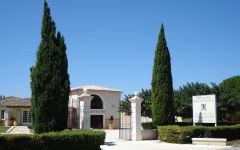Domaine Grand Veneur Chateauneuf-du-Pape 2003
-
Wine
Spectator -
Robert
Parker


Product Details
Your Rating
Somm Note
Winemaker Notes
- Robert Parker Jr., The Wine Advocate, 90-92 pts
"Loaded with dark currant and blackberry fruit, this has sinew, muscle and flesh to its texture along with tar, grilled beef and mineral notes pumping through the finish. Best from 2006 through 2020."
- J.M., Wine Spectator Insider, 92 pts
Professional Ratings
- Wine Spectator
- Robert Parker's Wine Advocate
Other Vintages
2012-
Robert
Parker -
Wine &
Spirits
-
Robert
Parker -
Wine
Spectator
-
Robert
Parker




Established in the northern part of Châteauneuf-du-Pape, in the commune of Orange, the Jaume family has been dedicated to the art of wine growing since 1826. Founded by Mathieu Jaume, the Domaine is now run by the 5th and 6th generations of Jaumes: Alain Jaume & his children Christophe, Sébastien, and Hélène.
Historically, Domaine Grand Veneur was known for its white wines, until 1995 when the winery refocused their efforts on the reds. The estate now measures 225 acres and covers four appellations: Chateauneuf-du-Pape, Côtes-du-Rhône 'Les Champauvins' & Côtes-du-Rhône (Rouge, Blanc & Rosé), Lirac, and Vacqueyras.
Both Grand Veneur and Clos de Sixte vineyards are grown in accordance with certified organic agricultural practices. The soils are maintained exclusively by light plowing and fertilized with vegetal compost. The vines are only sprayed when there are justified risks to the health of the vines, and only organic-permitted treatments are used. Yields are low, or kept under control by green-harvesting. This method, carried out by hand in summer, provides optimum sun exposure for the best clusters and enables the winery to be selective on both quantity and quality of the grapes. Harvesting is by hand, from pruning the leaves to aerate the clusters to picking and sorting grapes and selecting only the best to press.
"There are few better run estates in the world than that of the Jaume Family’s Domaine Grand Veneur," - Jeb Dunnuck
" ...the overall standard of quality is high, and Americans have learned to trust Alain Jaume et Fils—with good reason" - Robert Parker's Wine Advocate

With bold fruit flavors and accents of sweet spice, Grenache, Syrah and Mourvèdre form the base of the classic Rhône Red Blend, while Carignan, Cinsault and Counoise often come in to play. Though they originated from France’s southern Rhône Valley, with some creative interpretation, Rhône blends have also become popular in other countries. Somm Secret—Putting their own local spin on the Rhône Red Blend, those from Priorat often include Merlot and Cabernet Sauvignon. In California, it is not uncommon to see Petite Sirah make an appearance.

Famous for its full-bodied, seductive and spicy reds with flavor and aroma characteristics reminiscent of black cherry, baked raspberry, garrigue, olive tapenade, lavender and baking spice, Châteauneuf-du-Pape is the leading sub-appellation of the southern Rhône River Valley. Large pebbles resembling river rocks, called "galets" in French, dominate most of the terrain. The stones hold heat and reflect it back up to the low-lying gobelet-trained vines. Though the galets are typical, they are not prominent in every vineyard. Chateau Rayas is the most obvious deviation with very sandy soil.
According to law, eighteen grape varieties are allowed in Châteauneuf-du-Pape and most wines are blends of some mix of these. For reds, Grenache is the star player with Mourvedre and Syrah coming typically second. Others used include Cinsault, Counoise and occasionally Muscardin, Vaccarèse, Picquepoul Noir and Terret Noir.
Only about 6-7% of wine from Châteauneuf-du-Pape is white wine. Blends and single-varietal bottlings are typically based on the soft and floral Grenache Blanc but Clairette, Bourboulenc and Roussanne are grown with some significance.
The wine of Chateauneuf-du-Pape takes its name from the relocation of the papal court to Avignon. The lore says that after moving in 1309, Pope Clément V (after whom Chateau Pape-Clément in Pessac-Léognan is named) ordered that vines were planted. But it was actually his successor, John XXII, who established the vineyards. The name however, Chateauneuf-du-Pape, translated as "the pope's new castle," didn’t really stick until the 19th century.
